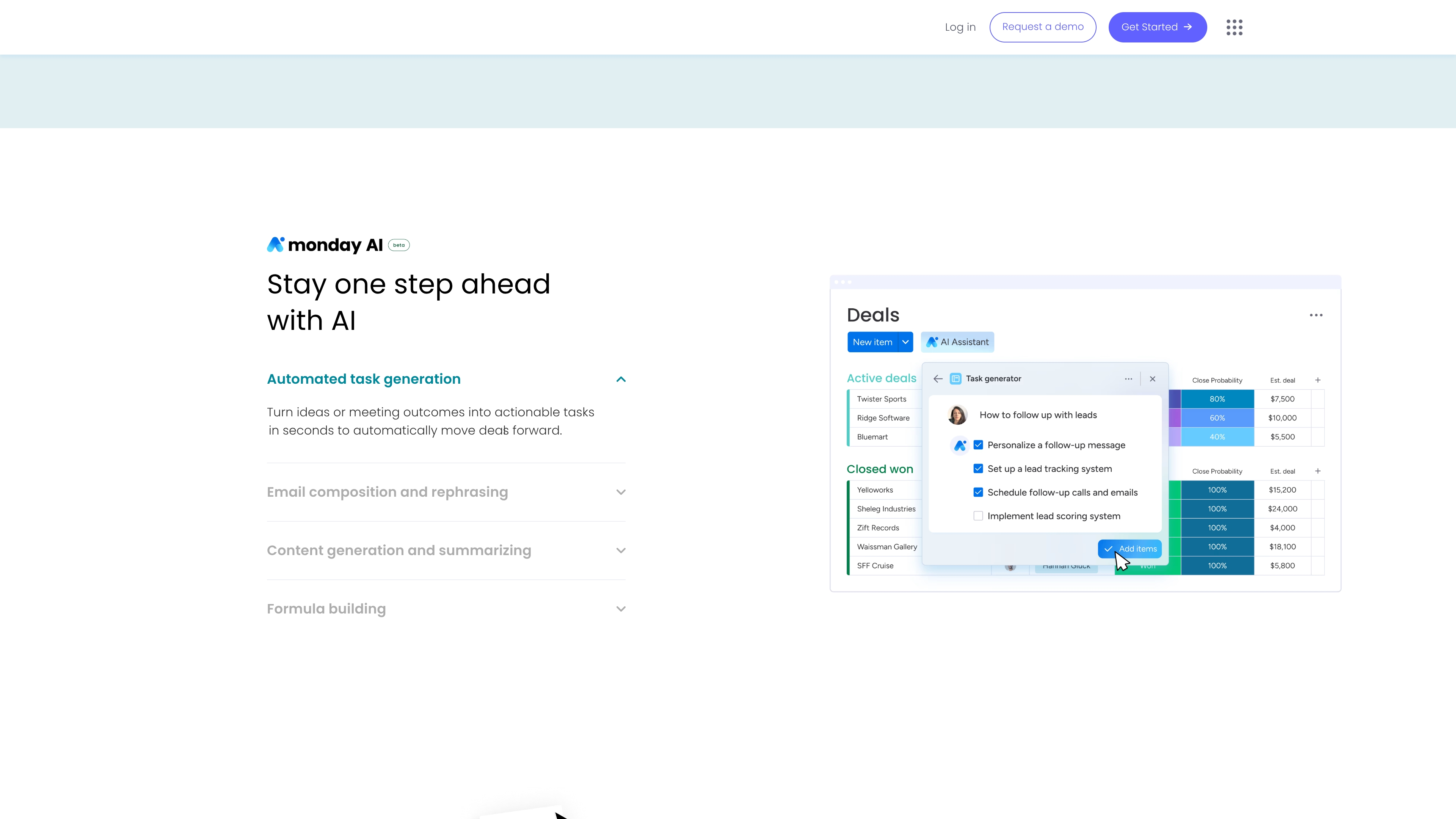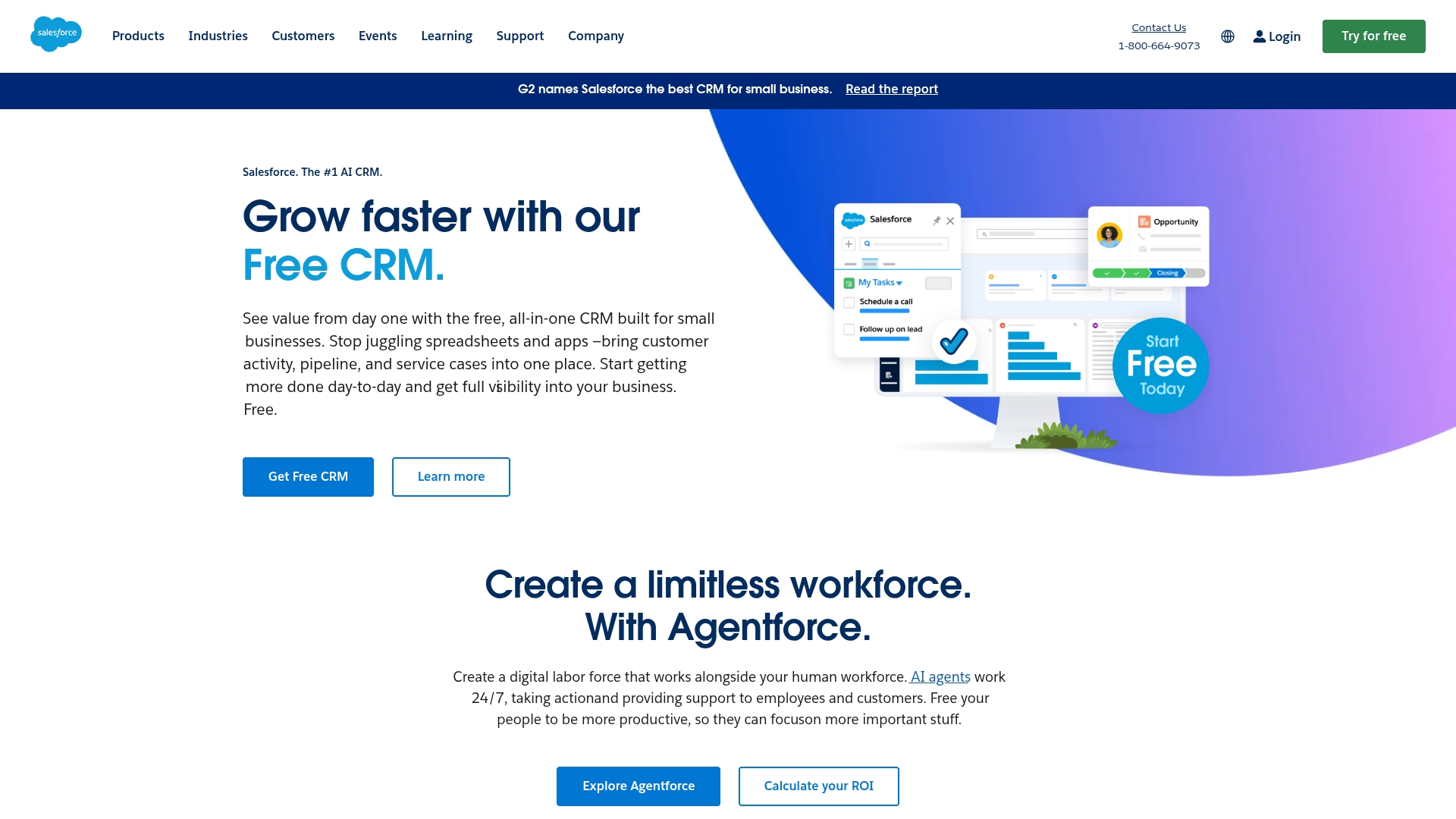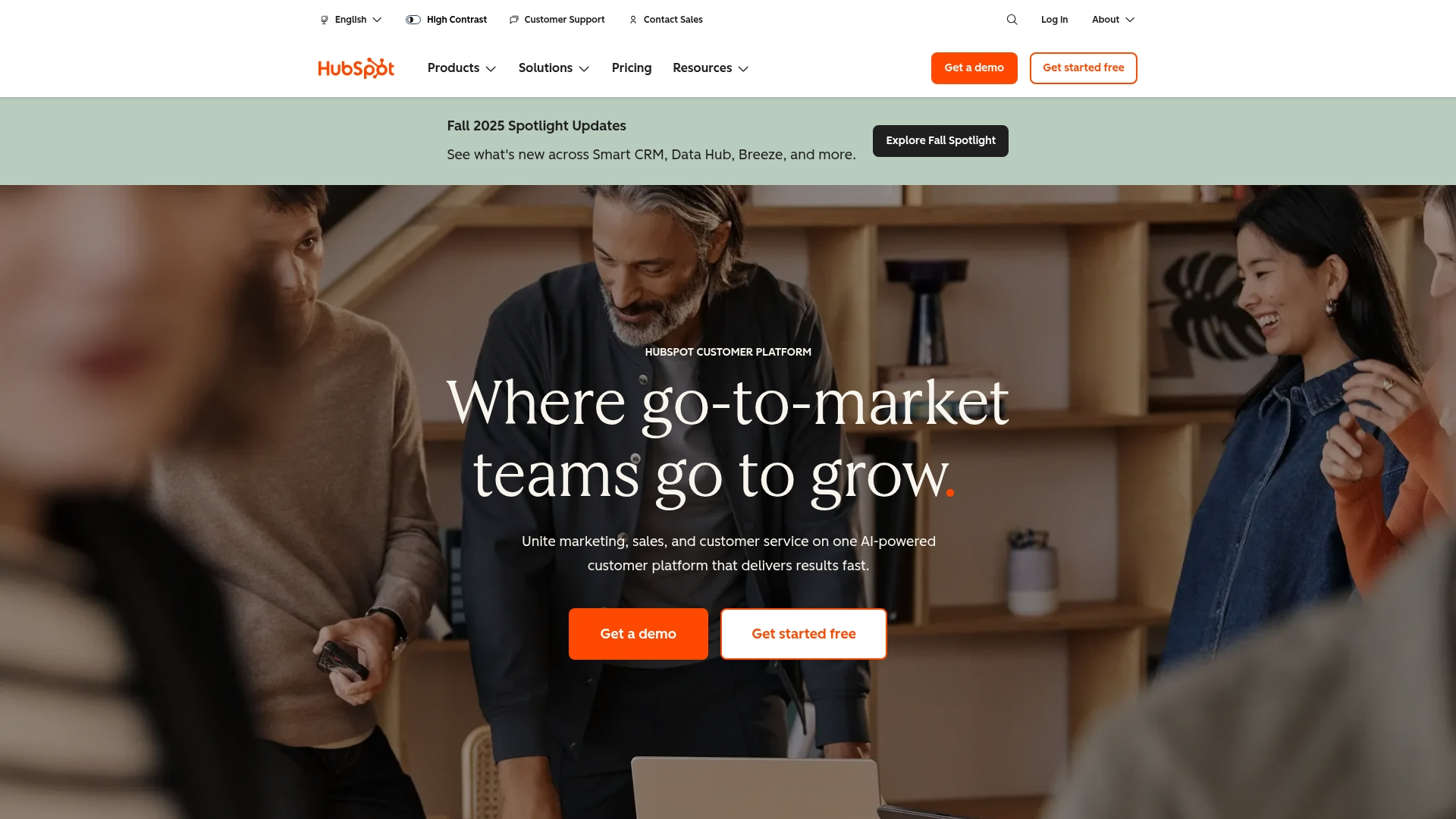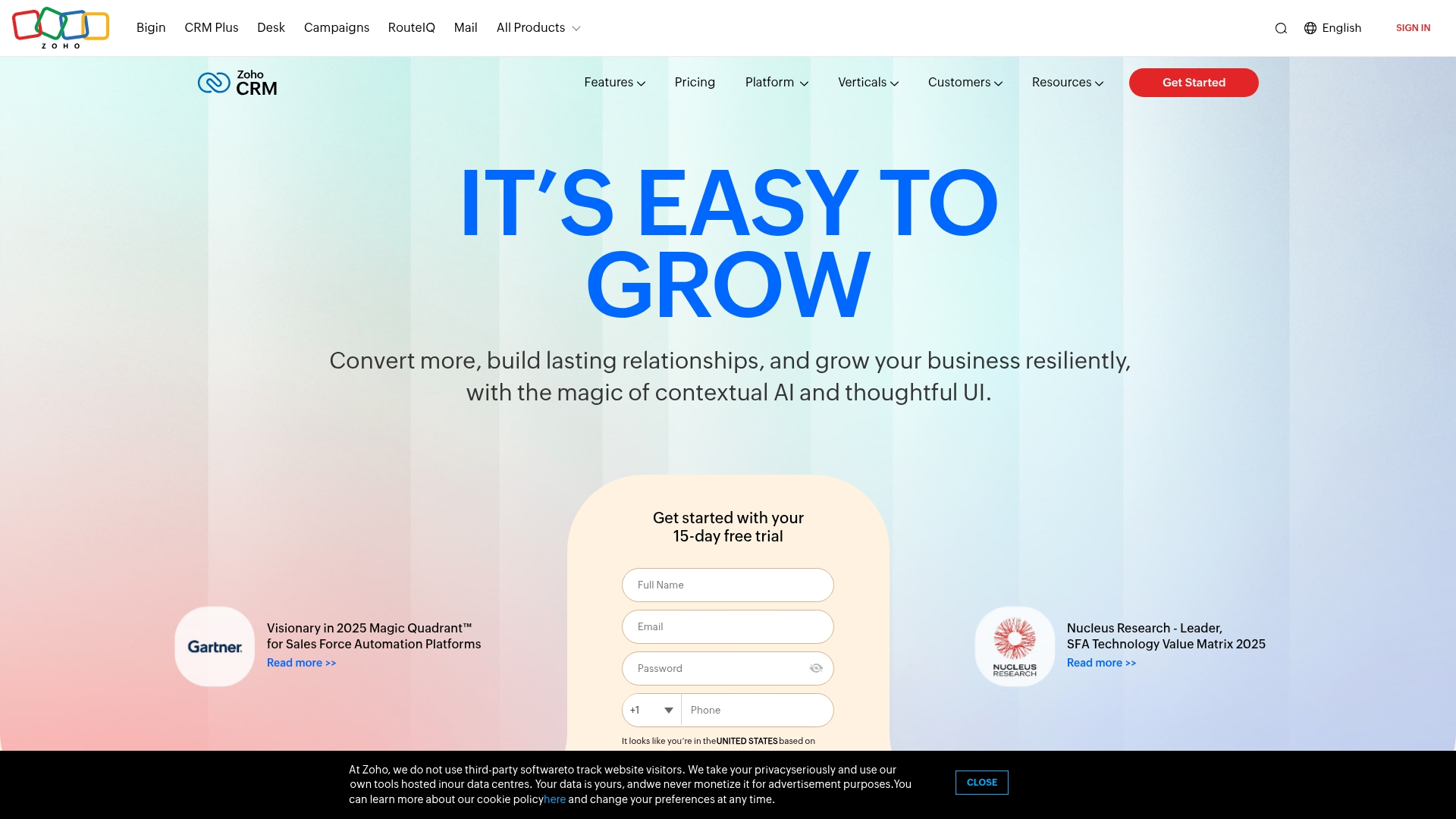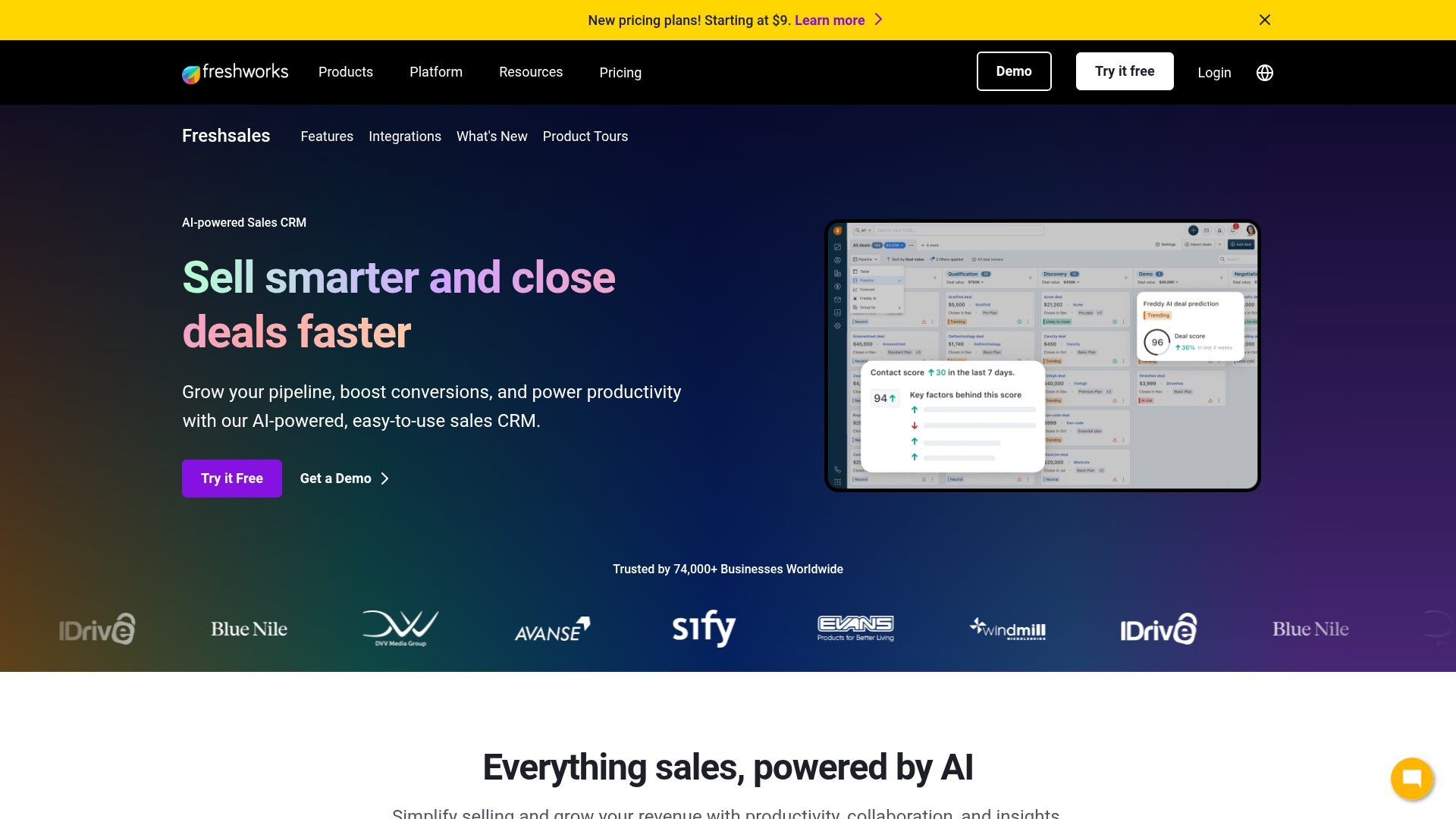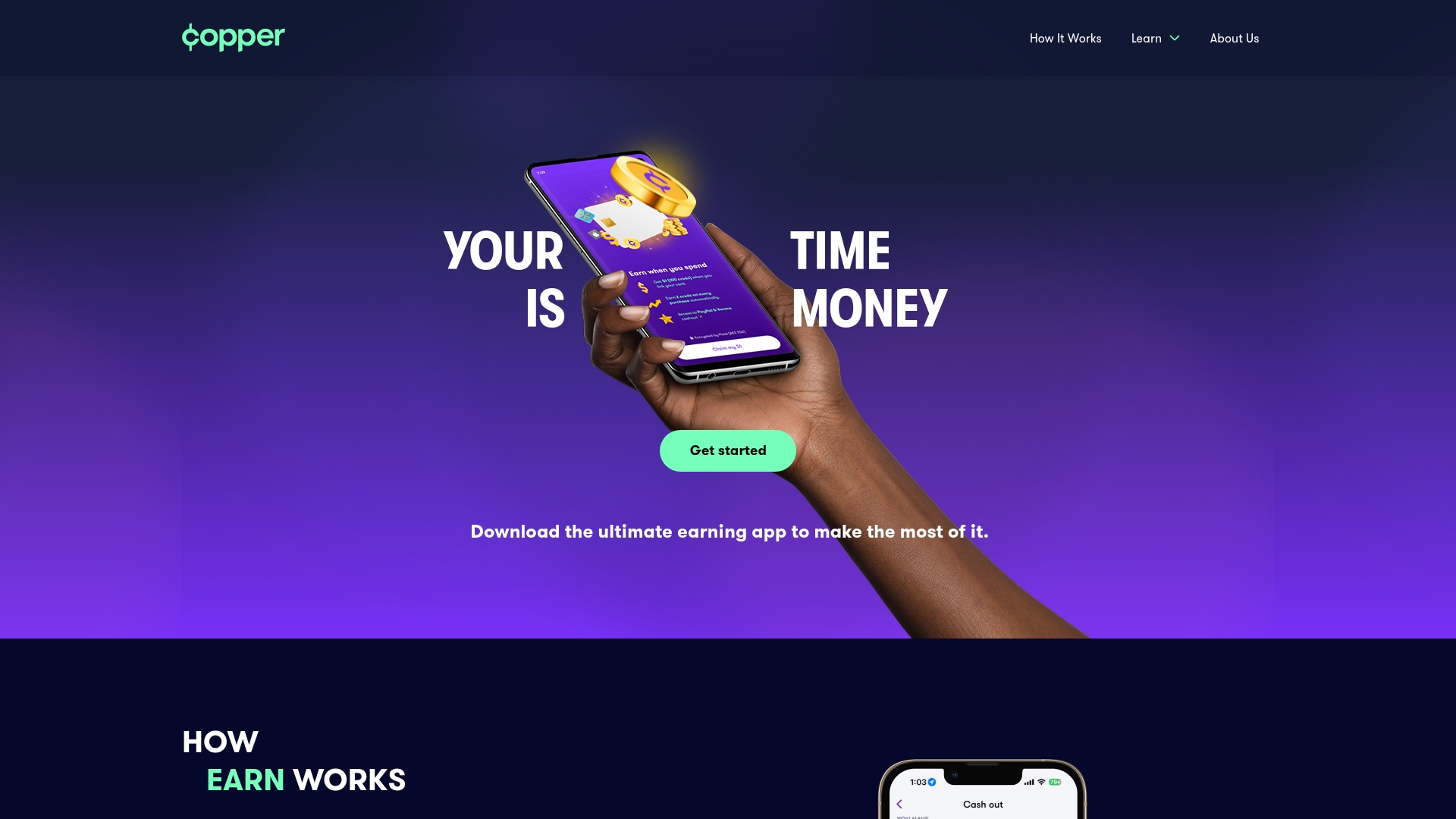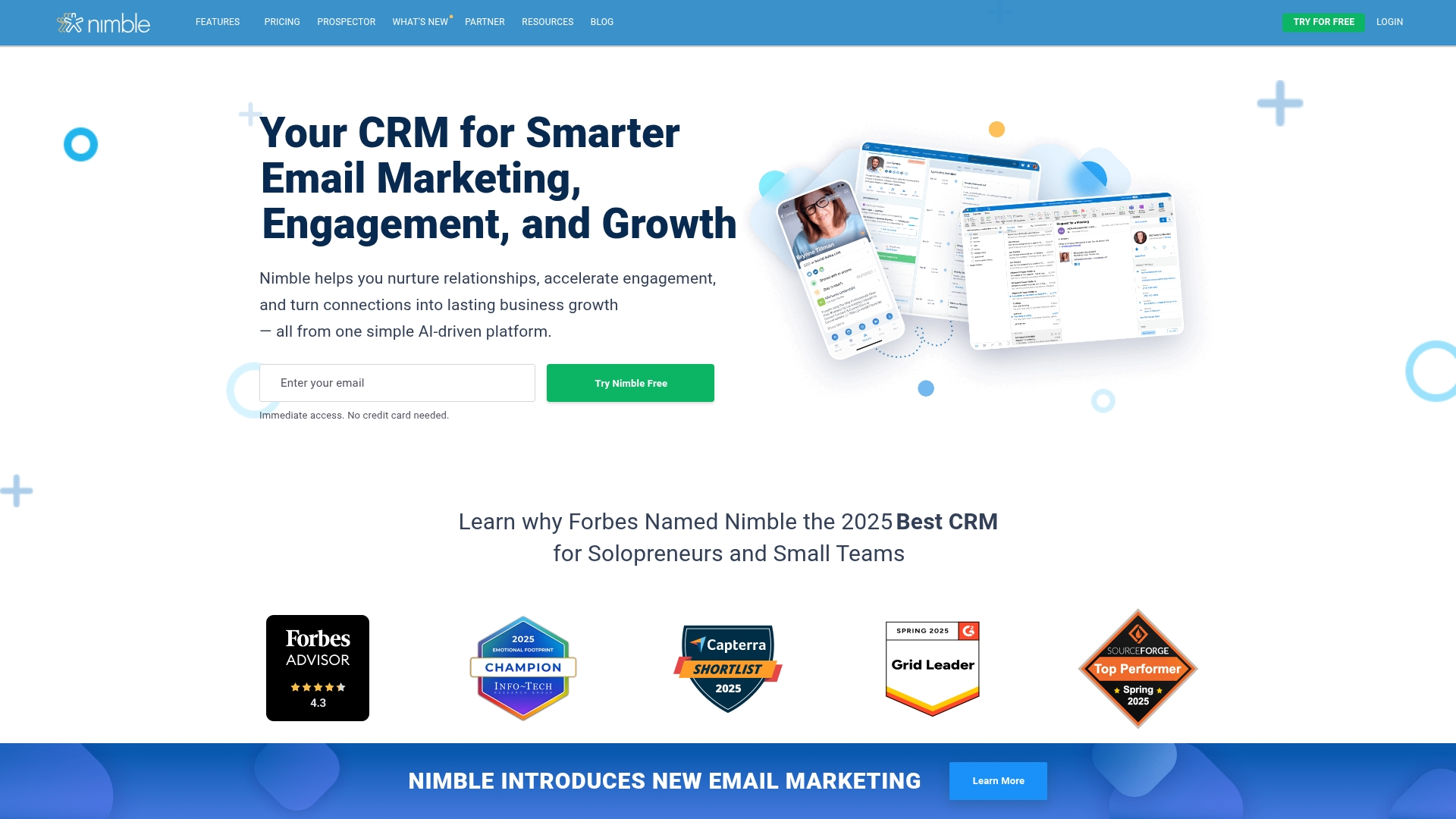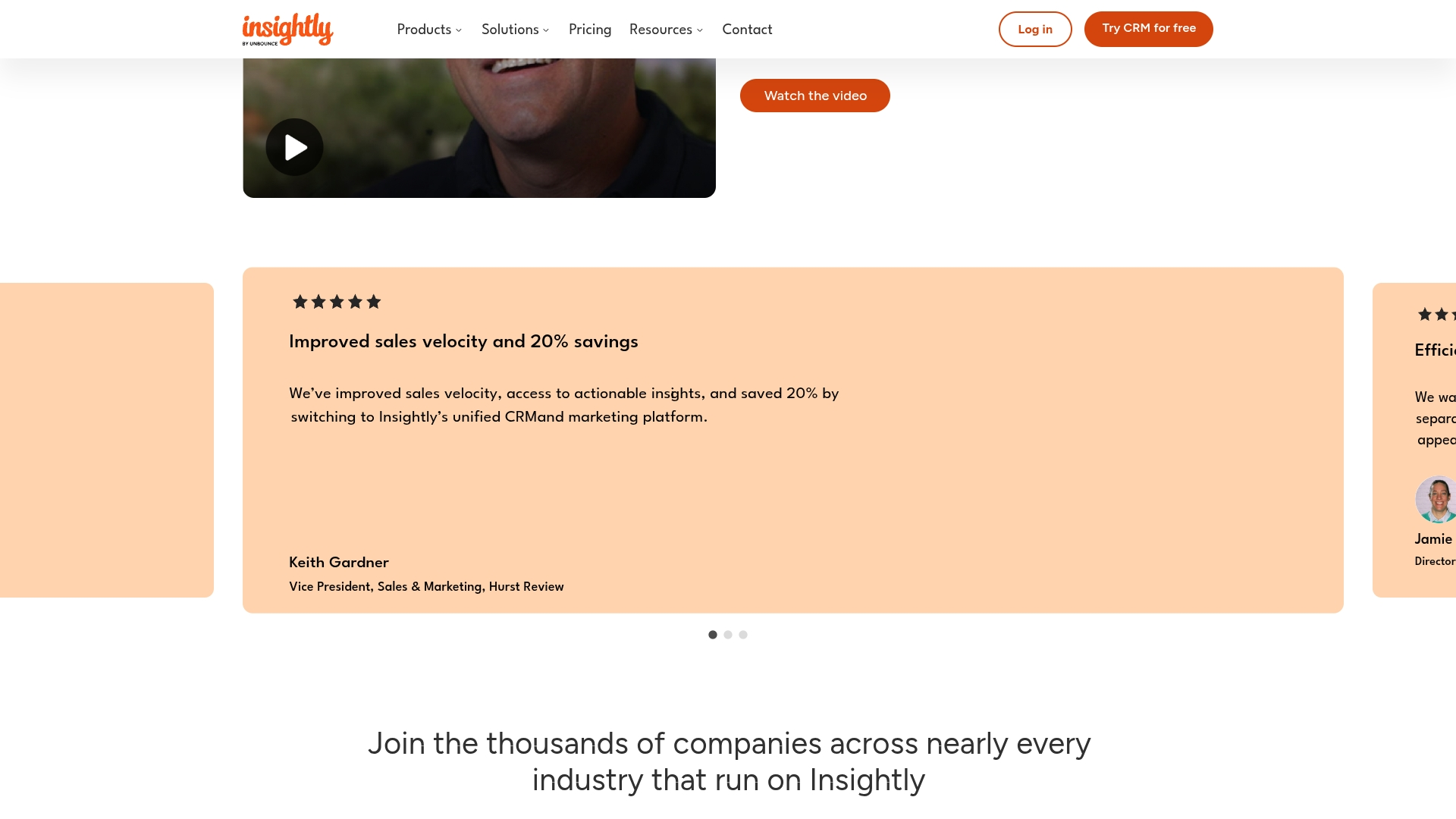A growing sales pipeline is a great problem to have, but without the right tools, it can quickly become unmanageable. Missed follow-ups, scattered spreadsheets, and disorganized notes often cause promising opportunities to slip through the cracks. That’s where lead tracking software steps in.
While a lead management system covers the bigger picture of nurturing prospects from first touch to final conversion, lead tracking software zeroes in on keeping your pipeline organized and moving. The right solution helps your team stay on top of every lead, automate routine follow-ups, and focus on closing deals instead of chasing data.
In this guide, we’ll explore the essential features of lead tracking software, review the best tools available in 2025, and show how these platforms can help you build a healthier, more predictable sales pipeline.
Key takeaways
- Eliminate missed opportunities: lead tracking software replaces spreadsheets and manual follow-ups with a reliable, organized system.
- Boost efficiency with automation: free your reps from repetitive tasks so they can focus on selling and building relationships.
- Track the metrics that matter: gain visibility into pipeline performance to make confident forecasts and coach teams effectively.
- Align sales and marketing: a shared platform ensures smoother handoffs and maximizes conversion of high-potential leads.
- Scale with confidence: monday CRM offers customizable workflows and automation to support growth at every stage.
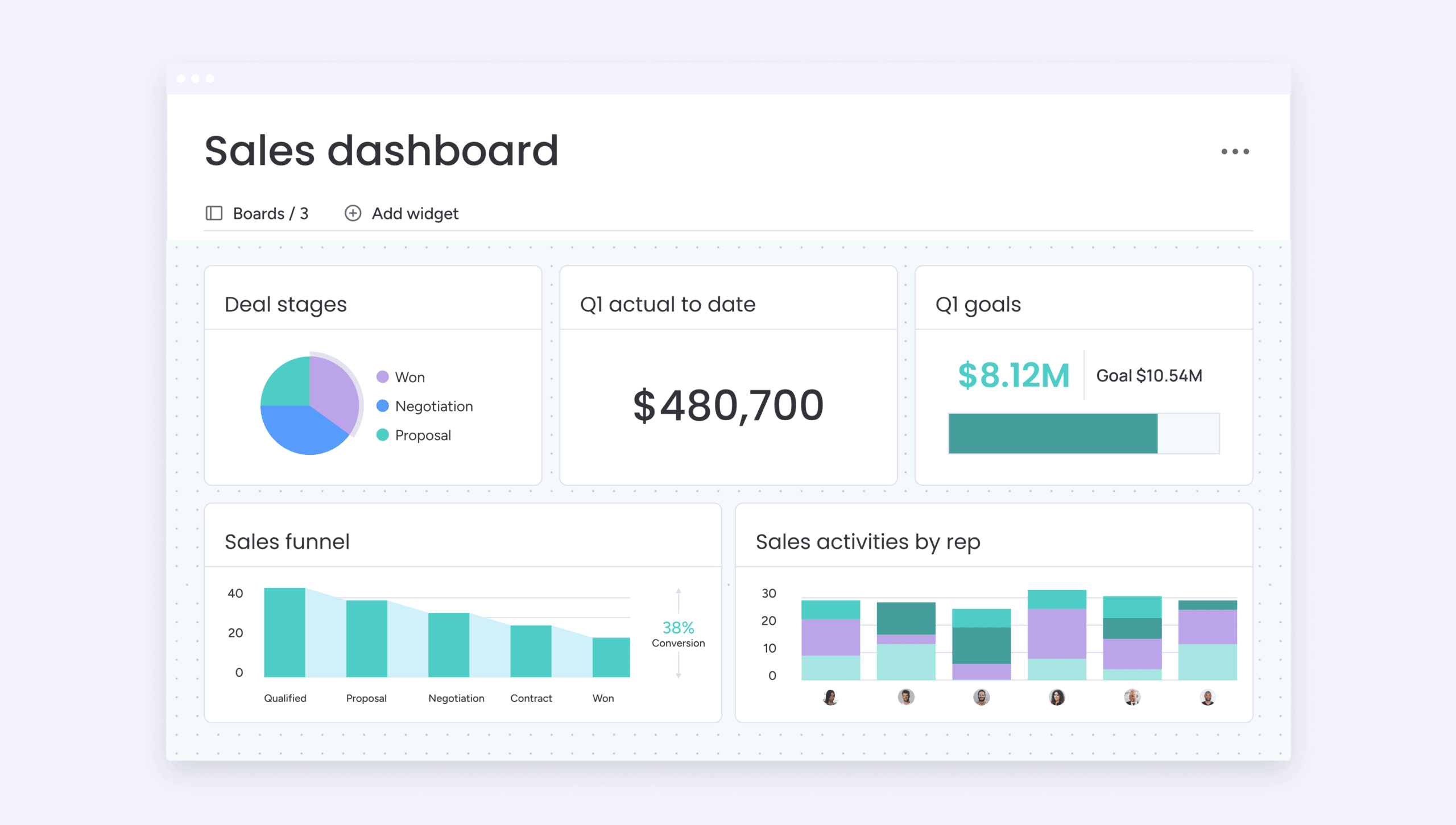
What is lead tracking software?
Lead tracking software functions as a strategic command centre for your sales team, converting disparate prospect information into a coherent, actionable pipeline. It offers a comprehensive overview of every opportunity, preventing promising conversations from falling through the cracks and empowering reps to make the right move at the crucial moment.
This system works by centralizing every new lead from all your channels — from web forms to email campaigns — so your pipeline is always organized and ready for action. With a powerful platform like monday CRM, you can then automate tedious busywork, freeing up your team to focus on what they do best: fostering client relationships and securing new business.
The real transformation happens when guesswork is replaced with a single source of truth. Instead of juggling spreadsheets or losing track of conversations, your team gets a unified view of every lead’s history, giving everyone the visibility and confidence to know exactly what to do next to win.
Key benefits of a lead tracking software
The very best lead tracking software solutions do more than organize contacts: they create clarity, speed, and consistency across your sales process so opportunities don’t slip away.
- One source of truth: replace messy spreadsheets and scattered notes with a unified view of your sales pipeline. This transparency keeps your team aligned, eliminates confusion, and ensures every opportunity is visible and actionable.
- Automation that drives focus: offload repetitive but critical tasks such as follow-ups and reminders to automation. With a platform like monday CRM handling routine work, your team can dedicate more time to high-value activities like strategic negotiation and customer engagement.
- Actionable insights: custom dashboards transform complex sales data into clear takeaways. By tracking the metrics that matter, you can instantly see what’s working, identify areas for improvement, and coach your team more effectively.
The result is a sales process that’s both predictable and scalable, giving your business the visibility and control needed to grow with confidence.
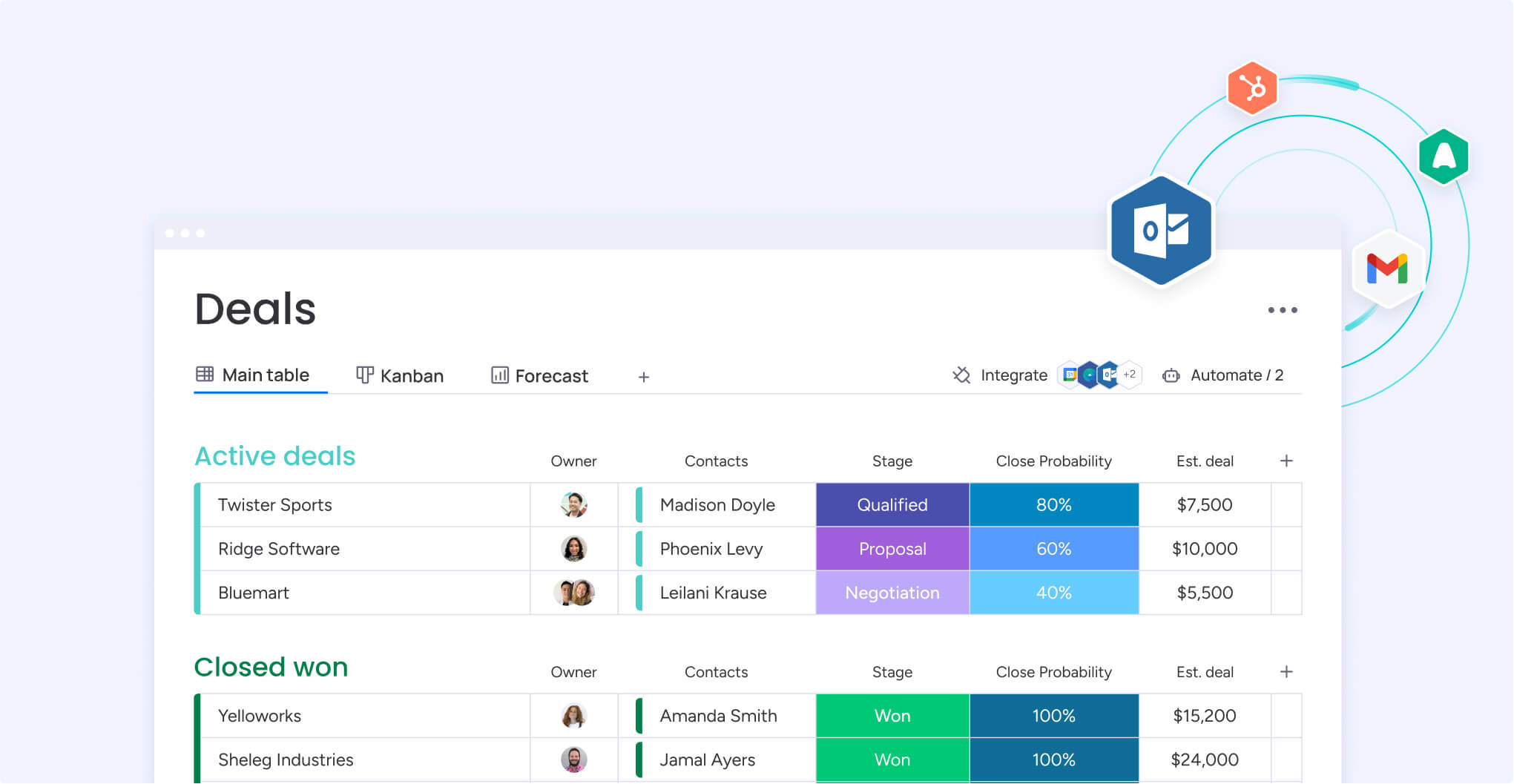
Top 10 sales lead tracking solutions
Picking the right sales platform can feel like a high-stakes decision, but it doesn’t have to be. It’s important to look past the flashy promises to find a platform that delivers genuine momentum for your sales team.
The goal is a system that adapts to your team’s unique rhythm, not the other way around. A great CRM should feel like a powerful extension of your team that automates tedious work, enabling your reps to focus on nurturing prospects and finalizing agreements with confidence. It’s about making their day easier, not adding another chore.
To help you find that perfect fit, we’ve broken down the top contenders. The table below highlights what makes each platform tick, who it’s built for, and how it can help your team crush its revenue goals.
| Platform | Pricing (starting) | Key features | Best for | Integrations |
|---|---|---|---|---|
| monday CRM | $10/user/month | No-code customization, AI blocks, workflow automation | Teams of any size needing flexibility | 50+ apps, incl. Slack, Gmail, Outlook |
| Salesforce | $25/user/month | Advanced customization, reporting, automation | Enterprises, large sales teams | 1000+ apps via AppExchange |
| HubSpot | Free, then $18/mo | Marketing + sales, free tier, automation | SMBs wanting all-in-one platform | Gmail, Outlook, Zapier, more |
| Pipedrive | $14/user/month | Visual pipelines, automation, reporting | Sales-focused SMBs | Google Workspace, Slack, Zapier |
| Zoho CRM | $14/user/month | Affordable, multi-app integration | Budget-conscious businesses | Zoho suite, Google, Mailchimp |
| Freshsales | $15/user/month | Built-in phone/email, automation | Teams needing communication tools | Freshdesk, Zapier, Google |
| Keap | $129/month | CRM + marketing automation | Small businesses, solopreneurs | QuickBooks, Zapier, Gmail |
| Copper | $23/user/month | Google Workspace integration, simplicity | Google-centric teams | Google apps, Slack, Mailchimp |
| Nimble | $24.90/user/month | Social CRM, contact intelligence | Social selling, networking | Office 365, Google, social media |
| Insightly | $29/user/month | CRM + project management | Service businesses, agencies | G Suite, Outlook, Mailchimp |
1. monday CRM
With its highly visual and intuitive design, monday CRM turns the often chaotic process of lead tracking into a streamlined, manageable workflow. Its strength lies in no-code customization and potent automations, augmented by AI to enhance communication, which serves teams seeking powerful CRM functions without a steep technical learning curve.
Example: Monday CRM provides a centralized, visual workspace where sales teams can capture, track, and nurture leads through customizable pipelines that adapt to any sales process without requiring technical expertise.
Key features:
- Centralized leads board with 15 dedicated columns for detailed lead tracking, plus automated and manual duplicate detection tools (available on standard plans and up).
- Intuitive no-code automation builder to handle lead sorting, status updates, and follow-up sequences, freeing your team from repetitive tasks.
- Integrated email and activity tracking with real-time communication logging and AI-generated email templates to speed up outreach (available on standard plans and up).
Pricing:
- Free Forever: $0 (up to 2 seats, 3 boards, basic features).
- Basic: $9/month per seat (billed annually).
- Standard: $12/month per seat (billed annually).
- Pro: $19/month per seat (billed annually).
- Enterprise: contact sales for custom pricing.
- Paid plans: require a minimum of 3 users.
- Monthly billing: available at a higher rate, while annual billing includes an 18% discount.
Why it stands out:
- Its visual, intuitive interface feels less like a stuffy old CRM and more like a platform your team will actually enjoy using.
- True no-code customization lets you build workflows that perfectly match your sales process — no IT help desk tickets required.
- Seamless integration with the broader monday Work OS connects sales with project management and other teams, creating a single source of truth for your entire organization.
2. Salesforce
Salesforce is one of the most established names in the CRM space, known for its powerful customization options and enterprise-level scalability. It offers a wide range of features designed to support organizations at every stage of growth, from early-stage startups to global enterprises.
Built on a cloud-native architecture, Salesforce provides extensive integration capabilities and a robust ecosystem of apps and add-ons. For businesses managing complex sales operations and seeking end-to-end visibility across the customer lifecycle, it remains a go-to choice.
Use case: Salesforce provides a unified platform that transforms raw prospect interest into revenue through structured lead capture, AI-powered scoring, and seamless conversion processes.
Key features:
- Automated lead routing and assignment rules that distribute prospects to the right sales reps based on geography, industry, or lead source.
- Einstein AI-powered lead scoring that ranks prospects by engagement level and demographic fit to prioritize high-potential opportunities.
- Comprehensive lead nurturing campaigns through integrated marketing automation tools that maintain engagement until prospects are ready to buy.
Pricing:
- Contact Salesforce directly for detailed pricing information.
- Multiple product tiers available (Starter, Professional, Enterprise, Unlimited editions).
- Pricing varies by product, role, and industry requirements.
- Annual contracts standard, with some monthly options available.
- Free trials offered for select products.
Considerations:
- Steep learning curve and complex interface can overwhelm teams without dedicated IT resources or certified administrators.
- High total cost of ownership when factoring in implementation, customization, training, and premium support add-ons.
3. HubSpot
By integrating marketing automation and sales tools into a single, cohesive platform, HubSpot provides a comprehensive solution for lead tracking. It is engineered for small to medium-sized businesses that really need an all-in-one system, allowing teams to consolidate their tech stack and create a seamless funnel from initial contact to final sale.
Use case: HubSpot’s Smart CRM platform centralizes all lead data and interactions in one place, enabling teams to track prospects from first contact through deal closure while automating nurturing workflows.
Key features:
- Automated lead scoring and routing that prioritizes high-value prospects and assigns them to the right sales representatives.
- Comprehensive lead tracking with full visibility into each prospect’s journey, including website visits, email interactions, and engagement history.
- Built-in workflow automation for lead nurturing campaigns that deliver personalized content based on prospect behavior and lifecycle stage.
Pricing: HubSpot offers several tiers to fit different business needs, including a free plan with core CRM features. Paid plans (Starter, Professional, and Enterprise) unlock progressively more advanced capabilities.
- Free CRM: includes basic lead management features to get you started.
- Starter, Professional, & Enterprise: these paid tiers introduce advanced automation, reporting, predictive lead scoring, and greater customization.
- For the most accurate and current costs, we recommend visiting HubSpot’s official website, as pricing can vary based on your plan, number of seats, and feature set.
Considerations:
- Pricing can escalate quickly as you add more contacts or require advanced features, making it expensive for growing businesses.
- Advanced lead management capabilities like predictive scoring and custom reporting are locked behind higher-tier plans, limiting functionality for budget-conscious teams.
4. Pipedrive
Pipedrive champions a visual, activity-based approach to sales, giving teams clear control over their deal flow. Conceived by salespeople for salespeople, its methodology is very effective for small to medium-sized businesses aiming for immediate results (without getting bogged down in complex features).
Use case: Pipedrive helps sales teams organize, qualify, and convert leads efficiently through customizable visual pipelines and automated lead management tools.
Key features:
- Visual pipeline management with drag-and-drop deal tracking and customizable stages.
- Dedicated Leads Inbox to store and qualify incoming leads before they enter the main sales pipeline.
- Smart Contact Data to enrich profiles with publicly available information.
- LeadBooster add-on with chatbot, live chat, web forms, and AI-powered sales prospecting software features.
- Messaging inbox integration to sync communications from apps like WhatsApp and Facebook Messenger.
Pricing:
- Lite: $14/month per user (billed annually).
- Growth: $39/month per user (billed annually).
- Premium: $49/month per user (billed annually).
- Ultimate: $79/month per user (billed annually).
- Free trial: all plans include a 14-day free trial.
- Add-ons available, with the LeadBooster add-on starting at $32.50/month per company.
Considerations:
- Advanced reporting and lead analytics features are limited in lower-tier plans, requiring upgrades for comprehensive insights.
- Marketing automation capabilities are basic compared to all-in-one CRM platforms, often requiring third-party integrations.
5. Zoho CRM
For businesses seeking extensive lead tracking capabilities without a hefty price tag, Zoho CRM is a leading contender. The platform’s main advantage is its seamless integration across a suite of over 50 business applications, creating a connected ecosystem for growing teams.
Use case: Zoho CRM provides an all-in-one lead management software that captures, scores, and nurtures leads across multiple channels while maintaining data privacy compliance.
Key features:
- Multi-channel lead capture from webforms, social media, live chat, and business card scanning.
- AI-powered lead scoring and prioritization through the Zia assistant.
- Automated lead nurturing with sequential follow-ups using Cadences.
Pricing:
- Free Edition: Free for up to 3 users with essential features.
- Standard: $14/user/month (billed annually).
- Professional: $23/user/month (billed annually).
- Enterprise: $40/user/month (billed annually).
- Ultimate: $52/user/month (billed annually).
- Team Users add-on: $9/team user/month (for non-sales users).
- Savings: up to 34% available with annual billing.
Considerations:
- Advanced features like full AI capabilities are restricted to higher-tier plans.
- Customer support can be slow for lower-tier plans, and the extensive feature set may overwhelm new users.
6. Freshsales
Freshsales offers an all-in-one CRM that consolidates sales, marketing, and customer communication into a unified workspace. With a focus on AI-powered lead scoring and built-in communication tools, it’s a strong choice for small to medium-sized businesses that want streamlined lead management without the overhead of an enterprise system.
Use case: Freshsales helps sales teams capture, nurture, and convert leads efficiently through AI-powered automation and integrated communication tools that eliminate the need for multiple platforms.
Key features:
- AI-powered lead scoring with Freddy AI that ranks prospects based on engagement and conversion likelihood.
- Built-in phone, email, and chat capabilities for seamless multi-channel communication within the CRM.
- Automated sales sequences and workflows that handle follow-ups, lead assignment, and status updates.
Pricing:
- Free: $0 for up to 3 users with basic features.
- Growth: $9/user/month (billed annually) with contact lifecycle stages and basic workflows.
- Pro: $39/user/month (billed annually) with AI-powered contact scoring and advanced workflows.
- Enterprise: $59/user/month (billed annually) with field-level permissions and forecasting insights.
- Free trial: 21-day free trial available with no credit card required.
Considerations:
- Advanced lead management features are locked behind higher-tier paid plans, limiting functionality for budget-conscious teams.
- Customer support response times can be slower, particularly for users on the free plan.
7. Keap
Designed specifically for small businesses, Keap provides an integrated CRM and marketing automation platform to streamline lead management. Its blend of powerful automation and user-friendly tools is well-suited for service-based businesses like consultants, coaches, and agencies that need to manage the entire customer journey without a complex technical setup.
Use case: Keap helps small businesses automate their entire lead-to-customer journey through integrated CRM, marketing automation, and sales pipeline management in one comprehensive platform.
Key features:
- Automated lead capture through customizable landing pages, forms, and social media integrations that feed directly into the CRM.
- Advanced automation workflows using “when-then” logic for personalized email and text message sequences based on lead behavior.
- Visual sales pipeline with drag-and-drop functionality to track deals through customizable stages.
Pricing:
- Pro plan: $249/month (billed annually at $2,988/year) for up to 50,000 contacts and 2 users.
- Additional users: $39/month per user.
- Text marketing tiers: starting at Tier 1 (500 messages, 100 voice minutes included), with higher tiers available from $24–$279/month.
- Implementation services: these are required for onboarding (pricing varies).
- Free trial: 14-day free trial available with no credit card required.
Considerations:
- Pricing can become expensive as contact lists grow, with mandatory implementation fees adding to initial costs.
- Advanced features like lead scoring are only available in higher-tier plans, limiting functionality for budget-conscious small businesses.
8. Copper
Copper operates as a seamless extension of Google Workspace, automatically capturing and organizing prospect data without pulling your team out of their existing workflow. Its zero-input CRM functionality is a major draw for small to mid-sized businesses that are heavily reliant on Gmail and want a sales process that feels effortless.
Use case: Copper eliminates manual data entry by automatically syncing lead information from Gmail conversations and enriching contact profiles with details from online sources.
Key features:
- Automated lead capture directly from your Gmail inbox with contact enrichment from web sources.
- Visual drag-and-drop sales pipelines with customizable stages that match your sales process.
- Workflow automation for repetitive tasks like follow-up reminders and deal stage updates.
Pricing:
- Basic: $29/month per user (billed annually).
- Professional: $69/month per user (billed annually).
- Business: $134/month per user (billed annually).
- Free trial: 14-day free trial available for all plans.
Considerations:
- Limited scalability for larger enterprises or rapidly growing companies that need advanced customization.
- Heavy dependence on Google Workspace means it’s not ideal for teams using other productivity suites.
9. Nimble
By automatically enriching contact profiles with social and business intelligence, Nimble turns relationship management into a competitive advantage. The platform’s social CRM capabilities are particularly valuable for small to midsize sales teams looking to leverage social media insights for stronger prospect connections.
Use case: Nimble helps sales teams build deeper prospect relationships by automatically gathering social media and business data to create comprehensive contact profiles that enable more personalized outreach.
Key features:
- Nimble Prospector browser extension captures contact information from any website, social media platform, or email to automatically create enriched contact records.
- Smart Contacts feature automatically updates profiles with social media activity, job changes, and business insights without manual data entry.
- Visual pipeline management with customizable Kanban boards and automated follow-up workflows to prevent leads from falling through the cracks.
Pricing:
- Business plan: $24.90/month per user (billed annually).
- Business plan: $29.90/month per user (billed monthly).
- Free trial: 14-day free trial available with up to 5 licenses and no credit card required.
- Add-ons available: email marketing ($15/month), data enrichment ($10 per 100 credits), web forms ($12/month per team).
Considerations:
- Limited to a single pricing tier which may not accommodate diverse business needs or budgets.
- Bulk email capabilities are restricted compared to dedicated marketing automation platforms, potentially limiting larger outreach campaigns.
10. Insightly
Insightly merges CRM with project management, offering a unified platform to guide leads from initial contact through to project completion. This integrated approach is especially beneficial for service businesses and agencies that must manage both customer acquisition and subsequent project execution.
Use case: Insightly serves small to mid-sized businesses that need integrated CRM and project management capabilities to streamline their entire customer lifecycle from lead generation to project delivery.
Key features:
- Lead scoring and grading with customizable models to prioritize high-potential prospects.
- Visual Kanban pipeline management with drag-and-drop functionality for tracking deal progress.
- Automated lead routing and assignment rules based on geographic area, company size, or custom criteria.
Pricing:
- Plus: $29/month per user (billed annually).
- Professional: $49/month per user (billed annually).
- Enterprise: $99/month per user (billed annually).
Considerations:
- Advanced lead management features like workflow automation and custom scoring are only available on higher-tier plans.
- Customer support response times can be slow on lower-priced plans, with limited support channels.
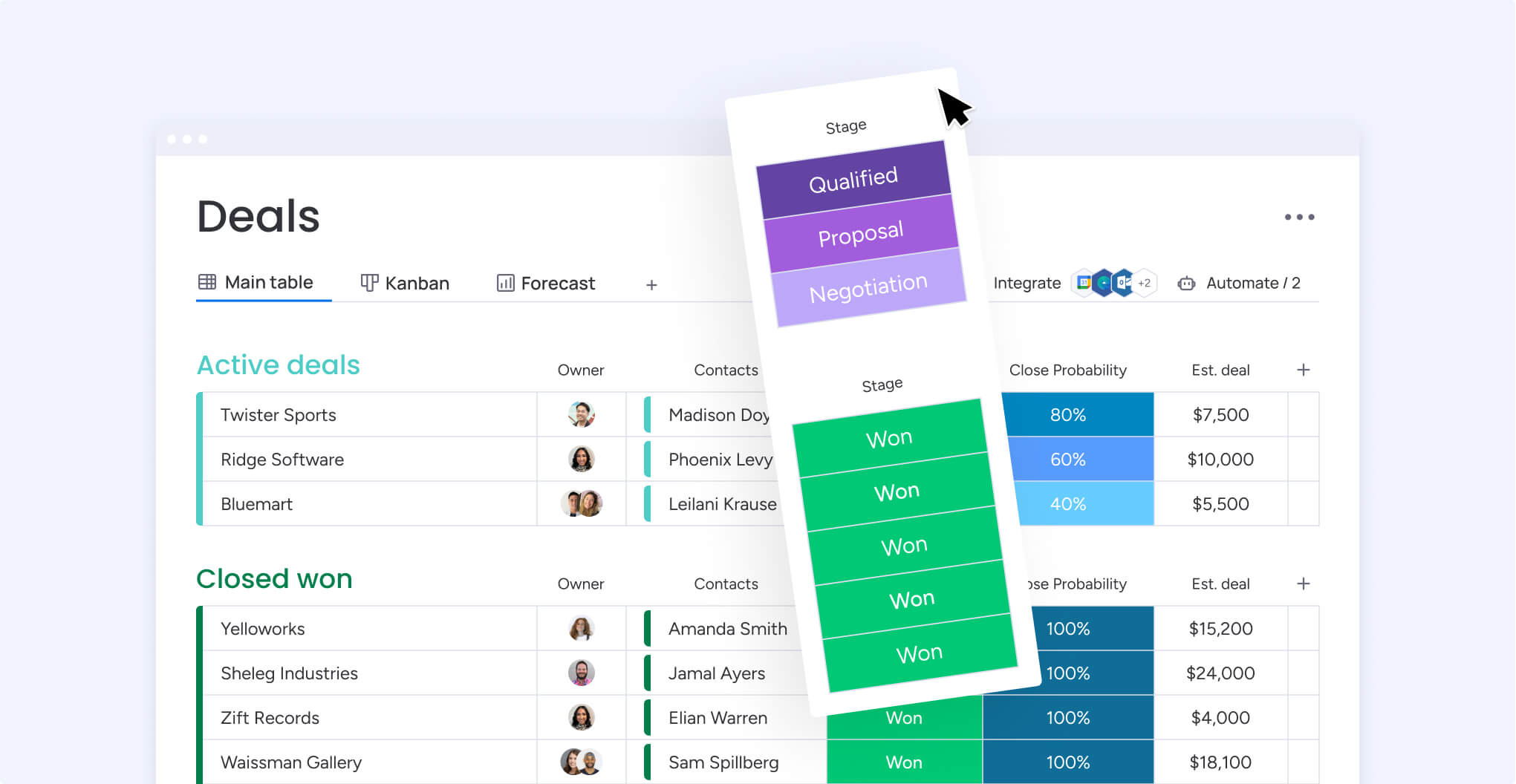
Are there free lead management tools for small businesses?
Yes — free platforms exist and can be a good starting point for organizing contacts. For very small teams, they offer a low-risk way to dip into lead management. But as your pipeline grows, the drawbacks of “free” often start to show. These tools usually come with hidden costs such as:
- Strict contact limits.
- Missing or restricted features.
- Manual workarounds that eat into selling time.
Soon, your pipeline feels less like a streamlined system and more like a patchwork of spreadsheets and stopgap solutions. When you’re spending more time managing tools than closing deals, it’s a sign you’ve outgrown the free tier.
This is where a scalable solution makes all the difference. monday CRM is designed to grow with your business, offering unlimited contacts, customizable workflows, and automation that keeps deals moving. By removing the bottlenecks of early-stage tools, you can focus on what really drives revenue: building relationships and securing more wins, faster.
How to boost revenue and efficiency with lead management crm software
The right lead management CRM doesn’t just organize contacts: it actively fuels revenue growth and streamlines how your team works. By consolidating data, automating processes, and keeping everyone aligned, it creates a system that’s both efficient and growth-focused.
- Pipeline visibility: with every interaction and deal stage tracked automatically, sales leaders gain a real-time view of the pipeline. This makes it easier to create confident forecasts, allocate resources effectively, and avoid end-of-quarter surprises.
- Free up selling time: monday CRM automates repetitive tasks like lead assignment and follow-ups, so your reps can focus on what matters most — building relationships, pursuing high-potential leads, and closing deals.
- Unify marketing and sales: when both teams work from the same platform, you eliminate gaps and confusion during handoffs. A single source of truth ensures that no opportunity is lost, while precise attribution helps you double down on the strategies that deliver results.
With these advantages, your team can work smarter, scale faster, and turn pipeline management into a consistent driver of revenue.
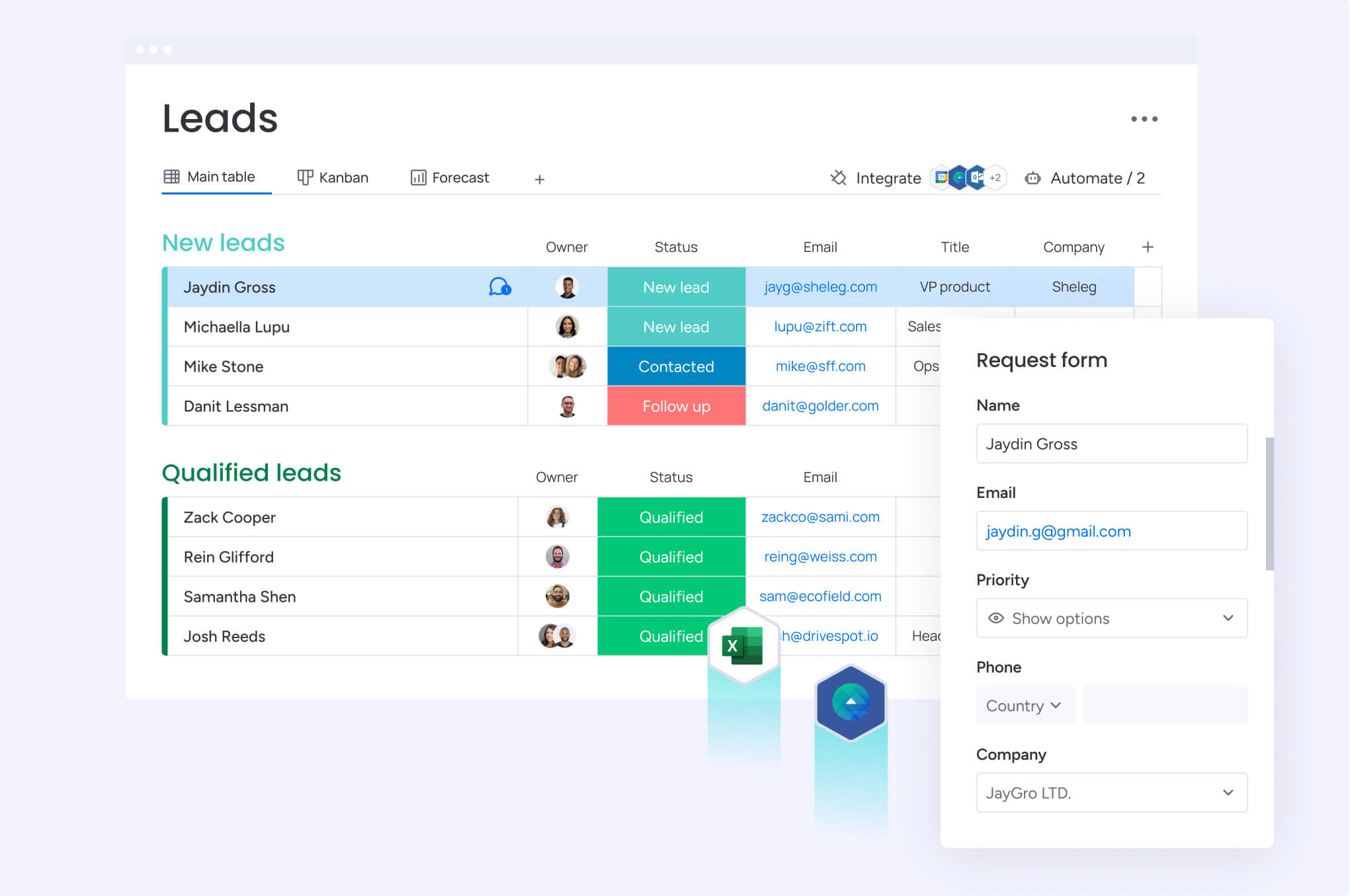
How to use AI and automations for smarter lead tracking
We’ve all faced a daunting list of leads, wondering where to begin. With AI and automation, you can finally exchange that uncertainty for a clear plan of attack, allowing the system to automatically surface the most promising opportunities so your team can focus on strategic engagement.
monday CRM puts that power directly in your hands, analyzing lead signals and even the emotional tone of emails to pinpoint who’s ready for a conversation. This isn’t about replacing sales instincts; it’s about augmenting them with data so energy is spent on relationships that are most likely to yield results.
The real beauty is how this intelligence adapts to fit your unique sales process, whether it’s a long B2B cycle or a fast-paced transactional model. You get all the power of an enterprise-level operation but with the agility to adapt and win as your team grows.
Move forward with the right lead tracking solution
A lead tracking solution should be more than just another tool. It should enhance your team’s rhythm, support your strategy, and adapt to the way you work — not the other way around.
The right platform prevents valuable leads from slipping through the cracks while giving your team the freedom to focus on nurturing prospects and closing deals. It also creates a central hub where sales and marketing can finally move in sync, eliminating silos and improving collaboration.
Built to bring that vision to life, monday CRM streamlines workflows, automates repetitive tasks, and helps teams move with greater speed and confidence. Get started with monday CRM today and see how it transforms your sales process.
The content in this article is provided for informational purposes only and, to the best of monday.com’s knowledge, the information provided in this article is accurate and up-to-date at the time of publication. That said, monday.com encourages readers to verify all information directly.
Frequently asked questions
How secure is my data in lead tracking systems?
Your data is secured through enterprise-grade encryption and compliance with standards like GDPR and SOC 2. Always verify a platform's security certifications, like those held by monday, to ensure your customer information is protected.
Which integrations should I prioritize for lead tracking software?
Prioritize integrations with your email, calendar, and marketing tools to create a single source of truth for your team. This eliminates manual data entry and allows reps to focus their energy on building relationships and selling.
Can AI replace human sales teams in lead management?
No, AI acts as a powerful assistant that automates repetitive tasks and surfaces key insights to help your team work smarter. The human touch remains essential for building relationships and closing complex deals.
What metrics matter most in lead management platforms?
Focus on conversion rates, sales cycle length, and deal size to get a clear picture of your pipeline's health. A great platform visualizes this data on custom dashboards for quick, strategic insights.
How long does it take to implement lead tracking software?
Implementation can take anywhere from a few days to a few weeks, depending on your team's specific needs. Intuitive, no-code platforms significantly reduce setup and training time, getting your team selling faster.
What happens to my existing lead data during software migration?
Your existing data is migrated into the new system, with most modern platforms offering services to ensure a seamless transfer. Look for a partner that provides dedicated support to minimize disruption and protect data integrity.


